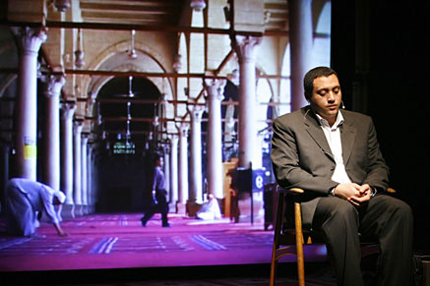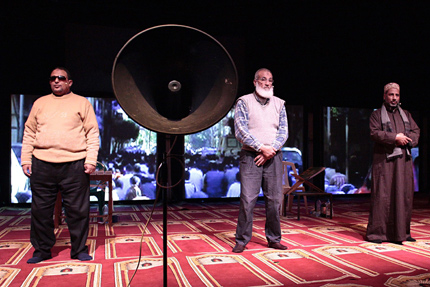
Results containing the tag: Radio Muezzin
As HAU’s stage went dark, four Egyptian muezzins illuminated by radiant white Klieg lights started their calls to prayer from the four corners of the auditorium. My first sensation, as I intently watched the dark stage from my seat in one of the front rows, was not determined by sight and vision, but by aurality: I felt pleasure mixed with unease derived from the suddenness of the sensory impact. While the voices were distinct, they produced a pleasant harmony of multivocality, reminiscent of choral or Gregorian chants. 

 What still resonates, and organizes for me the memory of the entire piece, is the sentence, pronounced quite early on, stating that one of the muezzin’s would only join the others on stage "later…" This announced delay, this procrastinated entering suggests already a kind of separation between those present on stage since the beginning and the belated one, and dramaturgically produces a sense of anticipation clouded by a question: "Why will he come only later?"
What still resonates, and organizes for me the memory of the entire piece, is the sentence, pronounced quite early on, stating that one of the muezzin’s would only join the others on stage "later…" This announced delay, this procrastinated entering suggests already a kind of separation between those present on stage since the beginning and the belated one, and dramaturgically produces a sense of anticipation clouded by a question: "Why will he come only later?" 
 On February 26 at the Kule Theatre in Berlin, I saw "Hotel Arabia" by Carola Lehmann and David Merten, who performed their voyage to ‘Arabia’ in a way reminiscent of the early European narratives from Barbary land. The tendency of exoticising otherness was apparent, and the commodification of cultural difference was at times disturbing during the performance. Rimini Protokoll’s intercultural projects, on the other hand, are neither about sublimating otherness nor reversing the gaze, but rather about the possibilities of transferring the debate taking place in developing countries to the metropolis, through the deployment (rather than invention) of the tradition of docu-drama. "Radio Muezzin", which premiered at the HAU 2 on the March 3, 2009, is a prime example of art that bridges the gap between cultures and reaches across the divide to the Other (the not I) during the ‘imperial’ present.
On February 26 at the Kule Theatre in Berlin, I saw "Hotel Arabia" by Carola Lehmann and David Merten, who performed their voyage to ‘Arabia’ in a way reminiscent of the early European narratives from Barbary land. The tendency of exoticising otherness was apparent, and the commodification of cultural difference was at times disturbing during the performance. Rimini Protokoll’s intercultural projects, on the other hand, are neither about sublimating otherness nor reversing the gaze, but rather about the possibilities of transferring the debate taking place in developing countries to the metropolis, through the deployment (rather than invention) of the tradition of docu-drama. "Radio Muezzin", which premiered at the HAU 2 on the March 3, 2009, is a prime example of art that bridges the gap between cultures and reaches across the divide to the Other (the not I) during the ‘imperial’ present. 







